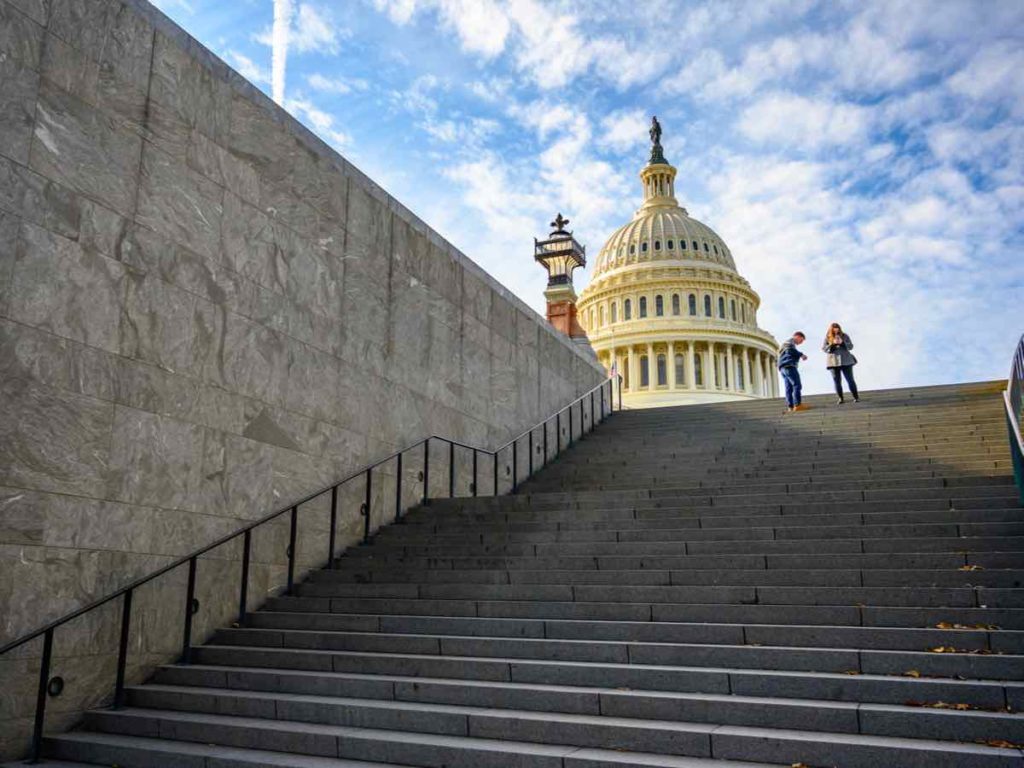Is Government a Good Major?
In many instances, popular majors are synonymous with more in-demand and higher-paying jobs. Out of the nearly 400 majors ranked by College Factual, government was #14 in popularity. Does this mean you should attend a college or university with a good bachelor’s degree program in government?
Government major is roughly similar to political science. And just like political science, government enhances many skills, including research, analytical thinking and communication, which makes graduates good candidates for jobs in various areas, from business, consulting, education to governmental work.
Read on if you are seriously thinking about majoring in government.
In this post, you will have a much better idea of what it’s like to be a government major and which institutions are great for a future government major like you. More importantly, we will also talk about some of the careers (and their respective annual salaries) available for you after earning your bachelor’s.
But before anything else, let’s answer this pressing question…

Government vs. Political Science: What’s the Difference?
Compared to political science, government is a much broader discipline. As a matter of fact, it blends political science with other fields such as law, world languages, literature, ethics and history. Meanwhile, political science is exclusive to studying the government in both theory and practice.
Between the two majors, there is no denying that political science is more popular than government.
Political science is also popular among students who plan on attending law school eventually. For instance, according to a report by the Law School Admission Council (LSAC), whose members consist of more than 200 law schools in the US, Canada and Australia, almost 20% of law school applicants are political science majors.
On the other hand, the next three most popular pre-law majors include English, history and psychology, each one of them with rates of approximately 5% only.
But keep in mind that there are no specific courses to take or undergraduate degrees to earn in order to be admitted to law school. So, whether you are planning on majoring in government or political science, you will still be able to get an acceptance letter from the law school of your choice if you are qualified.
What law schools look for are applicants who have excelled in challenging courses and majors.
Degree programs being offered at some colleges and universities may blur the line that separates government and political science majors to a certain extent. If truth be told, some even use government and political science interchangeably. However, the general consensus is that government provides a broader and stronger foundational knowledge.
As a matter of fact, majoring in government is recommended for degree-seeking students who want to obtain advanced studies in fields such as public policy, law and even political science.
Is Government Hard in College?
Government can be a challenging yet fulfilling major for degree-seeking students who wish to gain a deeper understanding of the government and the nature of politics. On the other hand, it can be difficult and boring for those who are not 100% certain that earning a bachelor’s degree in government is for them.
The difficulty of a major can be subjective. For instance, while chemical engineering can be a grueling major for someone who hates math and physics, it can be a delightful major for someone who is into STEM.
So, in other words, government is hard in college only for those who are not genuinely into it.
However, it doesn’t mean right away that you will be able to complete the program effortlessly even if government is at the top of your college majors list. Because government majors study everything from policy making, public administration to government security, you will have to work hard if you want to earn a diploma.

The core courses are some of the most important courses government majors are required to take. That’s because they provide foundational knowledge in the discipline. Some common examples of these core courses include:
- American government
- Comparative politics
- International relations
- Political theory
Besides core courses, government majors also have to take a number of electives from an approved list. At Georgetown University, for instance, undergraduate students must take a total of six electives.
At most colleges and universities, students who are working on a bachelor’s degree in government can choose from a host of specializations within the major. Each one of them usually consists of upper-division courses, typically amounting to a total of 12 credits. Some examples of available specializations among government majors include:
- American politics and policy
- International politics and policy
- Political philosophy
- Political theory
- Strategic intelligence
Please keep in mind that core courses, required electives and specializations can vary from one undergraduate program in government to the next. And this is why you should carefully research beforehand which program of your preference is being offered by which institution, especially if you already have a well-defined career path.
And speaking of career paths, you can define yours further by taking a minor that will equip you with skills that can make your resume more marketable. Among government majors, some of the popular minors include:
- Advertising
- Business
- Computer science
- Economics
- Education
- English
- Finance
- Foreign language
- History
- Information technology
- Marketing
- Math
- Psychology
- Sociology
Planning on attending law school after majoring in government? Then consider checking out the admissions requirements of your preferred law school before deciding on a minor so that you can choose wisely.
Government Major Careers and Salaries

Refrain from assuming that majoring in government is only ideal for degree-seeking students who are planning on attending law school or running for public office after graduation.
Majoring in government can open doors to a wide variety of career opportunities for you.
Whether you already have a solid career path in mind or none, check out the following job options available after earning your undergraduate degree in government:
Broadcast news analyst
- Median annual salary: $48,370
- Job outlook in 10 years: 6%
Also sometimes referred to as correspondents, broadcast news analysts report the news on TV or the radio. Besides presenting, they also discuss and interpret current events or stories the public ought to know. Broadcast news analysts conduct interviews, too, either live or recorded for future broadcasts.
Because of the fact that news can happen anytime, it’s important for broadcast news analysts to be willing to work additional hours or change their schedules as necessary, or work nights or over the weekend.
Urban planner
- Median annual salary: $78,500
- Job outlook in 10 years: 7%
The US population increased by 0.57% from 2021 to 2022. In order to help accommodate population growth, urban planners spring into action. They are tasked with developing programs and plans for land use. Most of their work hours are spent meeting with local public officials, developers and even the public.
Bachelor’s degree holders qualify for junior urban planner or urban planner assistant positions. Senior urban planners typically have a master’s from an accredited program, such as one by the Planning Accreditation Board (PAB).
Public relations specialist
- Median annual salary: $62,800
- Job outlook in 10 years: 11%
Just about anything that can help individuals, groups or organizations obtain and maintain a good image is carried out by public relations specialists. They are responsible for a lot of things, ranging from writing press releases, arranging for interviews, drafting the speeches of their clients to evaluating public opinion.
New York employs the most number of public relations specialists — more than 25,500 work in the state. Other states with the highest employment rates for public relations specialists are California, Texas and Washington, DC.
Government research analyst
- Median annual salary: $133,380
- Job outlook in 10 years: 10%
Due to the skills they get to obtain in college, government majors make for some of the most eligible research analysts for various governmental agencies. As the job title suggests, they are individuals who examine and analyze programs by the government and determine solutions or provide recommendations in order to improve outcomes.
Some of the everyday tasks of government research analysts include conducting independent investigations, performing cost studies, and creating and presenting reports based on collated information.

Social media manager
- Median annual salary: $133,380
- Job outlook in 10 years: 10%
A lot of people assume that social media managers only have one task: increase followers. While they are responsible for that, there are many other things that they need to take care of, too. Some of them include creating social media campaigns, producing content, facilitating customer service and reviewing analytics.
Because of their stressful and busy work, it’s important for social media managers to possess certain important qualities such as communication, writing, organization, creative, and digital and traditional marketing skills.
Campaign manager
- Median annual salary: $62,336
- Job outlook in 10 years: 13%
Coordinating the many different activities and operations of a political campaign — such is what campaign managers do. They are responsible for anything from advertising, fundraising to polling. It’s also a part of their many duties to recruit and train individuals for the successful implementation of various campaign plans and programs.
Exceptional communication, organization and problem-solving skills are a must for campaign managers to have. Top-notch leadership and managerial skills are also just as important for them to have.
High school teacher
- Median annual salary: $61,820
- Job outlook in 10 years: 8%
Government majors make for excellent high school teachers of various social science subjects. Some common examples are civics, history and geography. They are also eligible for administering some Advanced Placement (AP) classes such as comparative government and politics, US history and human geography.
However, high school teachers should first obtain a license or certificate. Such is done by completing a district- or state-approved teacher preparation program and passing the required exam.
News anchor
- Median annual salary: $48,370
- Job outlook in 10 years: 6%
Simply put, news anchors report news stories, usually over a live broadcast, on television and radio shows. Also sometimes referred to as news presenters or newscasters, typically, they read from teleprompters and note cards. Qualities such as public speaking, interpersonal and interviewing skills are important for news anchors to have.
In the country, New York has the most number of employed news anchors, amounting to more than 1,500. There, they make an hourly mean wage of $45.92 or an annual mean wage of $95,510.

Data analyst
- Median annual salary: $60,125
- Job outlook in 10 years: 25%
The primary role of data analysts, whether working for the government or some other employer or industry (business, finance, healthcare, retail, private firms, etc.), is to collect, clean and interpret data in order to be able to provide answers to questions or solutions to existing problems.
Most data analysts have a bachelor’s in math, computer science, economics or something else, depending on where they work. Needless to say, possessing strong numeracy, detail-oriented and analytical skills is critical.
Human resource specialist
- Median annual salary: $62,290
- Job outlook in 10 years: 10%
Even though there is such a thing as a bachelor’s in human resources, which is a common minimum requirement for human resource specialist candidates, those who majored in government, due to their extensive knowledge of the nature of government and politics, are qualified to work as human resource specialists at governmental agencies.
For increased marketability, it’s a good idea for government majors to undergo certification programs. Some examples are the SHRM Certified Professional (SHRM-CP) and HR Certification Institute (HRCI) programs.
Best Schools for Government Majors
The vast majority of the best schools for students who wish to earn a bachelor’s in government are funded by the government themselves: public and state colleges and universities. This provides a great opportunity for low-income students to be able to major in government at a fraction of the cost.
Many things are considered by graduating high schoolers who want nothing but a balanced college list.
Fortunately for those who are from low-income families and want to take advantage of cheaper tuition costs at in-state schools, there are numerous public and state institutions offering an undergraduate degree in government, many of which are highly ranked, too, by many reputable college ranking sites.
Below is a list of highly recommended colleges and universities for a future government major like you. I have also included the estimated cost of attendance (COA) for each one to facilitate the college selection process.
| INSTITUTION | ESTIMATED COA |
| University of California – Los Angeles | $36,787 (in-state) and $66,541 (out-of-state) |
| University of California – Berkeley | $41,528 (in-state) and $71,282 (out-of-state) |
| University of North Carolina at Chapel Hill | $24,546 (in-state) and $51,725 (out-of-state) |
| Florida State University | $23,126 (in-state) and $35,644 (out-of-state) |
| University of Washington – Seattle | $29,319 (in-state) and $56,688 (out-of-state) |
| University of Texas at Austin | $28,928 (in-state) and $57,512 (out-of-state) |
| University of Florida | $21,431 (in-state) and $42,648 (out-of-state) |
| Arizona State University | $29,578 (in-state) and $47,668 (out-of-state) |
| University of Central Florida | $22,838 (in-state) and $38,170 (out-of-state) |
| University of California – San Diego | $35,311 (in-state) and $65,065 (out-of-state) |
| University of Maryland – College Park | $27,807 (in-state) and $53,919 (out-of-state) |
| University of California – Irvine | $36,041 (in-state) and $65,795 (out-of-state) |
| Texas A&M University | $31,467 (in-state) and $58,024 (out-of-state) |
| Ohio State University | $28,664 (in-state) and $50,648 (out-of-state) |
| University of Wisconsin – Madison | $27,158 (in-state) and $55,046 (out-of-state) |
| George Washington University | $76,276 |
| University of Michigan – Ann Arbor | $31,484 (in-state) and $67,802 (out-of-state) |
| University of California – Santa Barbara | $36,949 (in-state) and $66,703 (out-of-state) |
| Georgetown University | $78,754 |
| Florida International University | $23,803 (in-state) and $35,611 (out-of-state) |
Majoring in government online is always a possibility. By attending a fully accredited online school, you can get your hands on a bachelor’s degree in government that can impress potential employers.
Top Online Schools for Government Majors
Unfortunately, not a lot of schools operating online offer a bachelor’s program in government, which can limit your options considerably. Below, you will come across a bunch of them. I did the research so that you don’t have to — you can rest assured that the undergraduate government degree you can earn from any of them is 100% legit.
Regent University
- Location: Virginia Beach, Virginia
- Cost: $450.00 per credit hour
- Acceptance rate: 50%
- Graduation rate: 49%
- Accreditor: Southern Association of Colleges and Schools Commission on Colleges (SACSCOC)
Average starting salary: $33,500 per year
Liberty University
- Location: Lynchburg, Virginia
- Cost: $390.00 per credit hour
- Acceptance rate: 100%
- Graduation rate: 49%
- Accreditor: Southern Association of Colleges and Schools Commission on Colleges (SACSCOC)
- Average starting salary: $33,700 per year
Grand Canyon University
- Location: Phoenix, Arizona
- Cost: $485.00 per credit hour
- Acceptance rate: 81%
- Graduation rate: 31%
- Accreditor: Higher Learning Commission (HLC)
- Average starting salary: $38,400 per year
University of Arizona
- Location: Tucson, Arizona
- Cost: $500.00 (in-state and out-of-state) per credit hour
- Acceptance rate: 85%
- Graduation rate: 61%
- Accreditor: Higher Learning Commission (HLC)
- Average starting salary: $39,500 per year
Just Before You Enroll in a Government Program
While it may seem like government and political science are one and the same, they are actually two different majors. Well, at least for some colleges and universities.
If you are planning on majoring in government, check if the school you are thinking about adding to your college list offers a good bachelor’s degree program in the discipline of study for the best possible college experience and career, too. Attending an online school is also an option provided that you will enroll in one that’s fully accredited.
Read Next: Is Finance a Good Major?
Disclaimer: The views and opinions expressed in this article are those of the authors and do not necessarily represent those of the College Reality Check.





